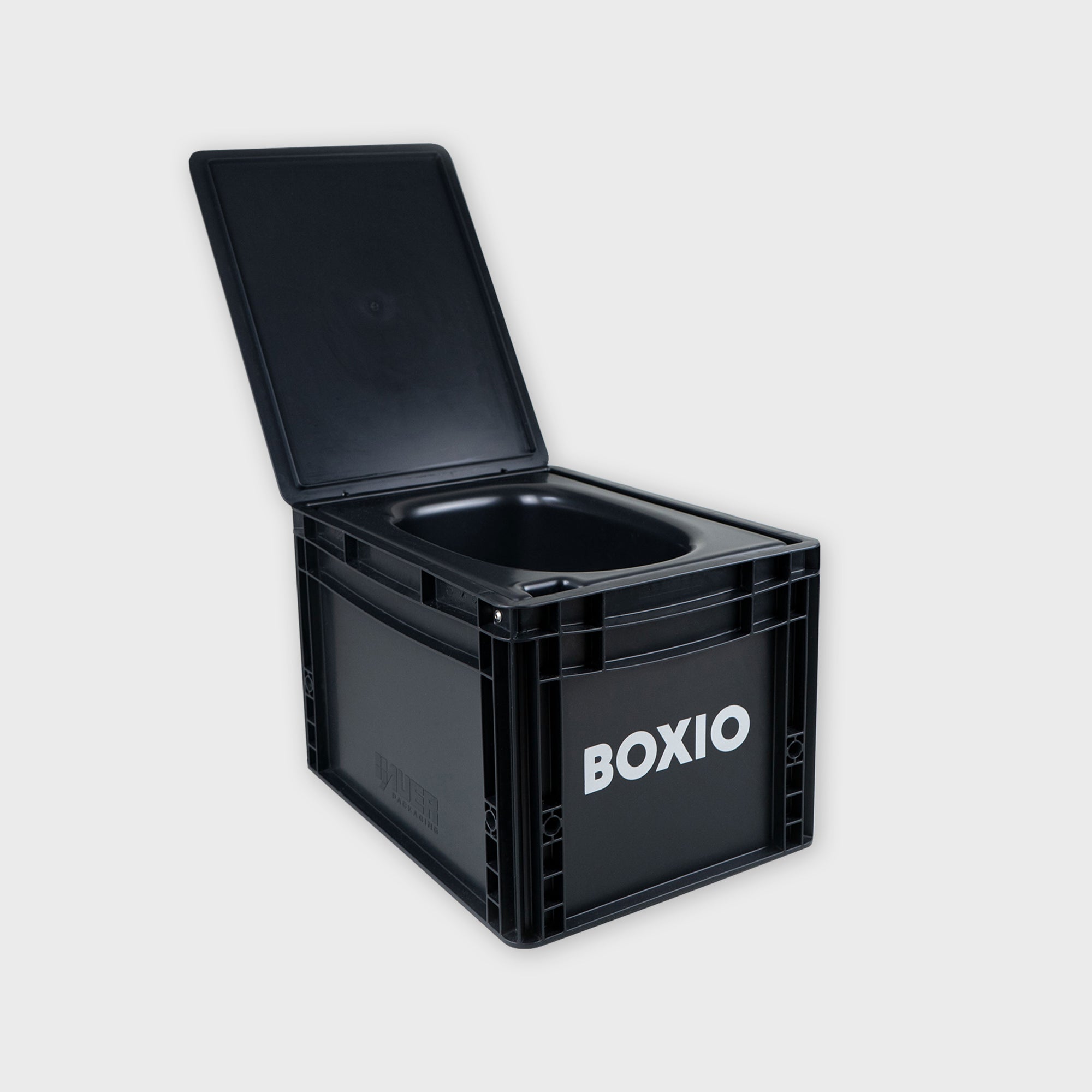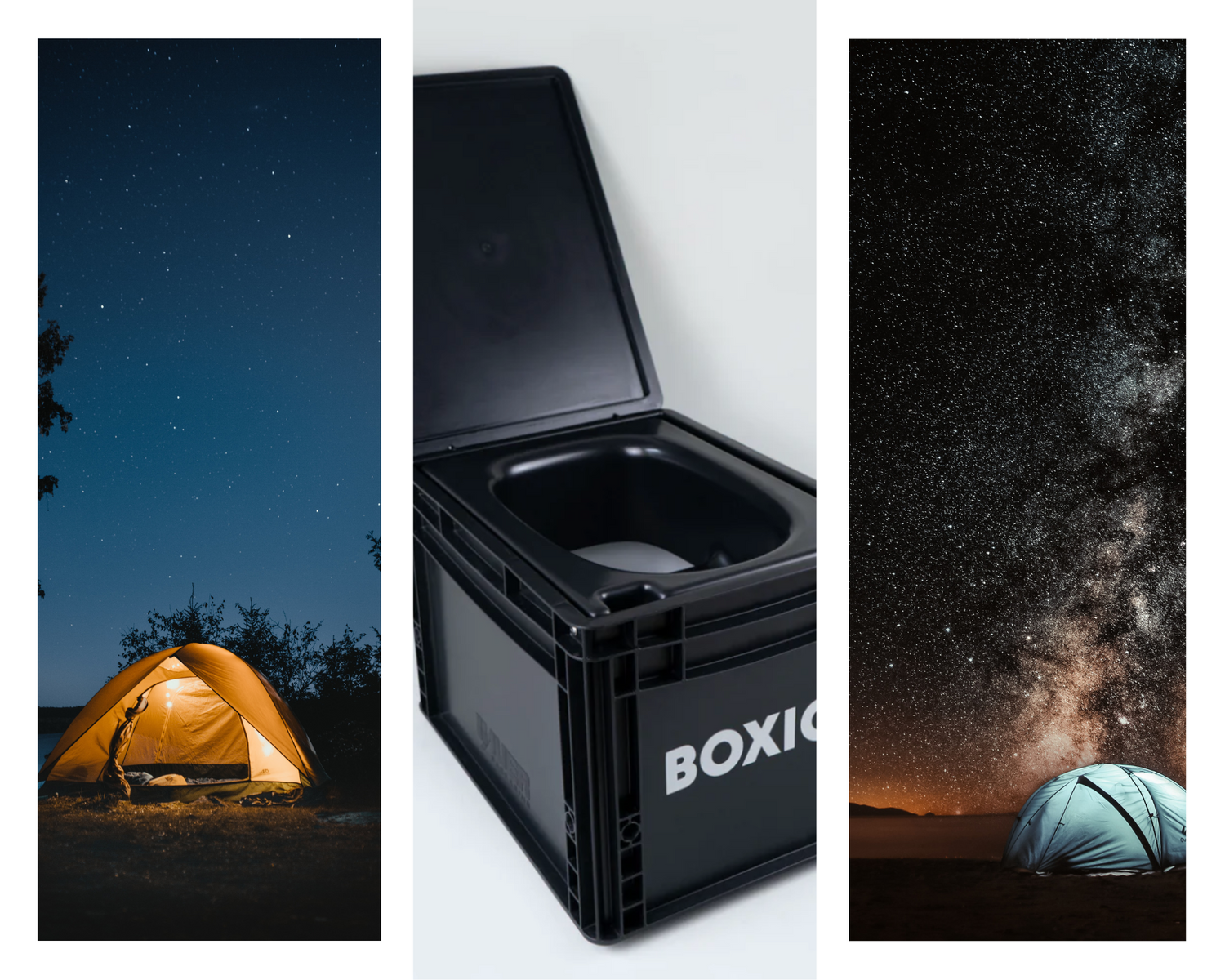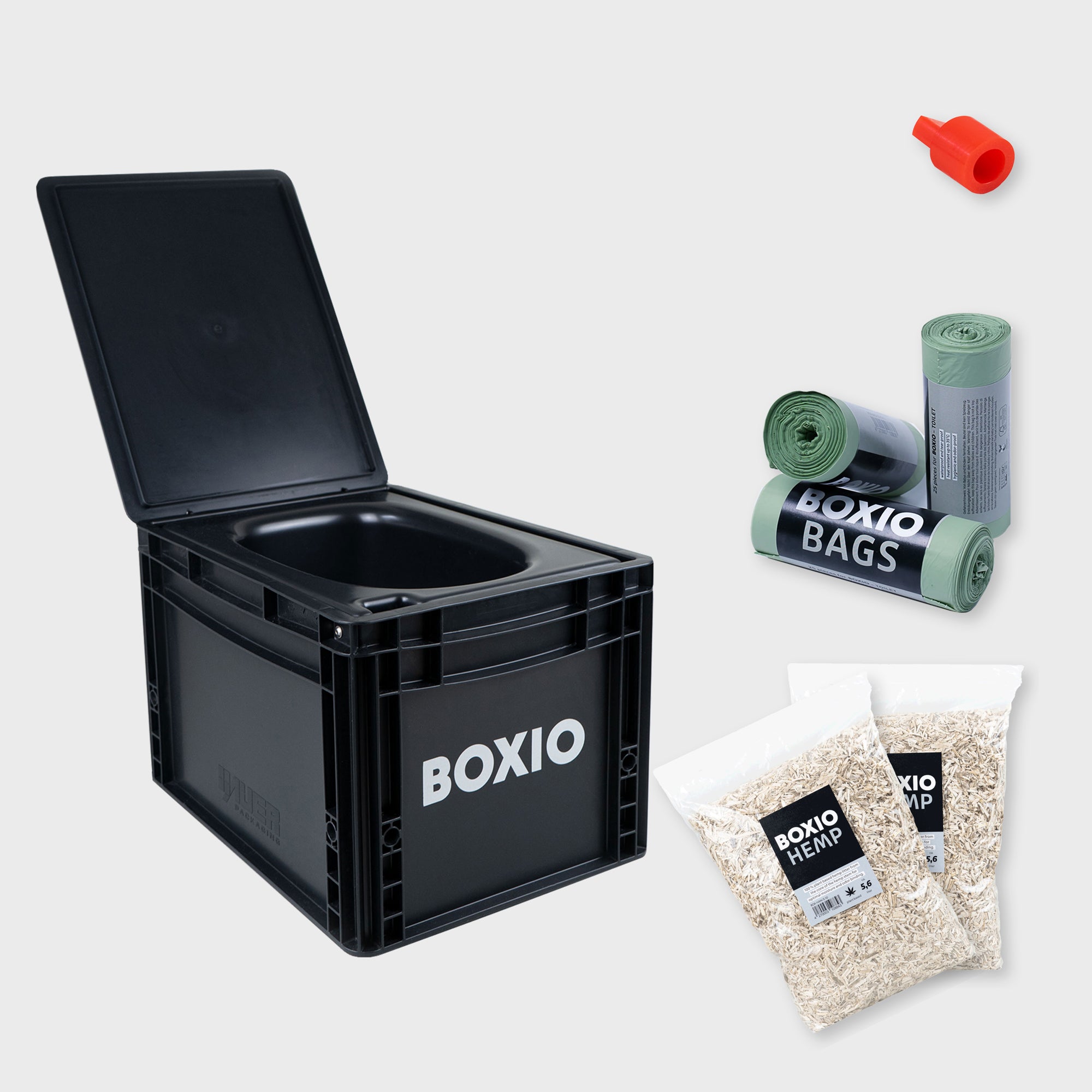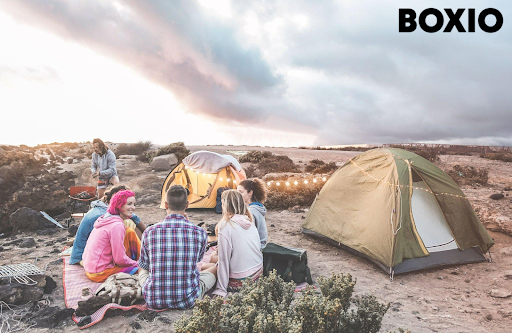
Camping is a fantastic way to escape the hustle and bustle of everyday life, connect with nature, and spend quality time with loved ones. However, while enjoying the great outdoors, we must also address the essential human need for proper sanitation. Enter the camping toilet – a crucial piece of equipment for any camping or outdoor adventure. In this blog post, we will discuss the importance of camping toilets, provide an overview of the different types available, and introduce you to the hassle-free, lightweight, and eco-friendly mobile toilet solutions offered by BOXIO.
Having a reliable camping toilet is essential for maintaining hygiene, comfort, and convenience during your outdoor excursions. A good camping toilet ensures that you can answer nature's call comfortably and safely, without causing harm to the environment or disrupting the serenity of your surroundings. Additionally, using a camping toilet helps prevent contamination of natural water sources, making it an environmentally responsible choice.
There is a wide range of camping toilets available on the market, each with its own set of features, pros, and cons. Understanding the differences between them will help you make an informed decision and choose the best option for your unique camping needs. With BOXIO's lightweight, stackable, and eco-friendly mobile toilet solutions, you can enjoy the outdoors without sacrificing comfort or convenience. Stay tuned as we delve deeper into the world of camping toilets and explore the various types available to enhance your outdoor experience.
Composting Toilets
For campers who prioritize sustainability and eco-friendliness, composting toilets are an excellent choice. These toilets use natural processes to break down waste, making them a more environmentally friendly option for outdoor sanitation.

Description and Features
Composting toilets rely on the natural decomposition process to transform human waste into nutrient-rich compost. They typically consist of two separate chambers for solid and liquid waste. The solid waste chamber is filled with a bulking agent like sawdust or coconut coir, which helps to create the right conditions for composting. The liquid waste is usually diverted to a separate container or evaporated to minimize odors and facilitate the composting process.
Pros
- Environmentally Friendly: Composting toilets do not require chemicals or water, making them an eco-friendly choice for campers who want to minimize their environmental footprint. The resulting compost can be used as a natural fertilizer, further reducing waste.
- Odorless: Due to the separation of solid and liquid waste and the use of bulking agents, composting toilets effectively control odors, keeping your campsite fresh and clean.
- Long-term Usage: Composting toilets can be used for extended periods before needing to be emptied, making them ideal for long-term camping trips, remote locations, or off-grid living.
- Discover BOXIO's Chemical-free, Waterless Separation Toilet: For a truly sustainable camping experience, consider BOXIO's chemical-free, waterless separation toilet. This innovative and eco-friendly solution allows you to enjoy the great outdoors while minimizing your impact on the environment.
Cons
- Expensive: Composting toilets tend to be more costly than other camping toilet options due to their advanced technology and features. However, the long-term savings in terms of reduced waste disposal and water usage can offset the initial investment.
- Requires Regular Maintenance: To ensure optimal performance, composting toilets require regular maintenance, such as adding bulking agents, turning the compost, and cleaning the liquid waste chamber.
- Bulky and Heavy: Composting toilets are generally larger and heavier than other types of camping toilets, making them less suitable for campers who require a lightweight and easily transportable option. They are best suited for stationary or semi-permanent setups, such as cabin retreats or long-term campsites.
In conclusion
Composting toilets provide an environmentally friendly, odorless, and long-term sanitation solution for campers who prioritize sustainability. Although they may be more expensive and require regular maintenance, the benefits of a composting toilet make it a worthwhile investment for eco-conscious adventurers. With options like BOXIO's chemical-free, waterless separation toilet, you can enjoy the great outdoors knowing that you're making a positive impact on the environment.
BOXIO - TOILET | Portable Composting Toilet

Chemical Toilets
Chemical toilets are a choice for many campers due to their effective odor control and ease of use. Designed for a variety of outdoor activities, these toilets provide a convenient sanitation solution for those on the go.

Description and Features
Chemical toilets consist of a portable unit with a built-in seat, a waste storage tank, and a separate tank for holding the chemical solution. The chemical solution, typically made of biocides and deodorizers, helps to break down waste and control odors. To use a chemical toilet, simply add the chemical solution to the waste tank, then flush the toilet after each use. The waste and chemical mixture is stored in the tank until it is ready to be emptied.
Pros
- Effective Odor Control: The chemical solution used in chemical toilets effectively neutralizes odors, ensuring a pleasant environment in and around your campsite.
- Easy to Use: Chemical toilets are simple to set up and operate, making them an attractive option for campers who want a hassle-free sanitation solution.
- Suitable for Various Outdoor Activities: Whether you're camping, boating, or attending an outdoor event, chemical toilets provide a convenient and portable sanitation option.
Cons
- Chemicals Can Be Harmful to the Environment: Some of the chemicals used in chemical toilets can be harmful to the environment, particularly if not disposed of correctly. It's essential to follow proper disposal guidelines and consider eco-friendly alternatives when available. Check out BOXIO's chemical-free, waterless separation toilet for a sustainable camping experience.
- Requires Disposal of Chemicals: Emptying a chemical toilet involves disposing of both the waste and the chemical solution, which can be a more involved process than emptying other types of camping toilets. You will need to locate a designated waste disposal site to ensure the safe and responsible disposal of the chemical waste.
- May Require Additional Accessories: To maintain the effectiveness of your chemical toilet, you may need to purchase additional accessories such as replacement chemicals, waste tank cleaners, and toilet tissue designed for use with chemical toilets.
Chemical toilets offer effective odor control and ease of use, making them suitable for various outdoor activities. However, it's important to be aware of the potential environmental impact of the chemicals used and to follow proper disposal guidelines. Be sure to consider the additional accessories required for optimal performance when choosing a chemical toilet for your camping adventures.
Bucket-Style Toilets
For campers seeking a straightforward, no-frills sanitation solution, bucket-style toilets offer a simple and cost-effective option. These basic toilets provide essential functionality without breaking the bank.

Description and Features
Bucket-style toilets are, as the name suggests, essentially a sturdy bucket with a toilet seat attached to the top. Some models come with a lid to help contain odors. These toilets are designed for use with disposable liners or bags, which can be easily removed and disposed of after use.
Pros
- Simple Design: The uncomplicated design of bucket-style toilets makes them easy to use and maintain. There are no complex parts or systems to worry about, making them an excellent option for those who prefer a no-fuss approach to camping sanitation.
- Cost-effective: Bucket-style toilets are generally more affordable than other types of camping toilets, making them a budget-friendly choice for campers who don't want to invest in a more expensive sanitation solution.
- Easy to Set Up: Setting up a bucket-style toilet is as simple as placing a disposable liner or bag inside the bucket and attaching the seat. This quick and straightforward process allows you to focus on enjoying your outdoor adventure.
Cons
- Lack of Odor Control: Unlike some other types of camping toilets, bucket-style toilets do not have a built-in odor control system. You may need to use additional odor-absorbing materials, such as sawdust or kitty litter, to help minimize smells.
- May Require Additional Supplies: To use a bucket-style toilet, you'll need disposable liners or bags, which can add to the ongoing cost of using this type of toilet. Additionally, you may need to purchase odor-absorbing materials to help control smells.
- Limited Capacity: Due to their simple design, bucket-style toilets have a limited waste capacity, which may require more frequent emptying, especially during extended trips or when used by multiple people.
Bucket-style toilets offer a simple, cost-effective, and easy-to-set-up sanitation solution for campers who prefer a no-frills approach. However, be prepared to manage odor control and ensure you have the necessary supplies on hand for a comfortable camping experience. For a more eco-friendly and compact option, check out the BOXIO TOILET which is a urine-diverting and composting toilet designed specifically for campers.
Folding Toilets
For campers who prioritize portability and ease of set-up, folding toilets are a practical choice. These compact and lightweight toilets are perfect for short camping trips, hikes, and other outdoor activities where space and weight are a concern.

Description and Features
Folding toilets consist of a collapsible frame with a built-in seat, designed to be used with disposable liners or bags. When not in use, the frame can be easily folded and stored in a compact carrying case. Some models may include additional features, such as a lid or a toilet paper holder, for added convenience.
Pros
- Compact and Lightweight: Folding toilets are designed for maximum portability, making them an ideal option for campers who need a lightweight and space-saving solution. The compact size allows for easy storage in your vehicle or backpack.
- Easy to Set Up and Take Down: Setting up a folding toilet is a breeze – simply unfold the frame, attach the seat, and place a disposable liner or bag in the designated area. Taking down the toilet is just as easy, making it a convenient option for those on the move.
- Affordable: Folding toilets are generally less expensive than other types of camping toilets, making them a budget-friendly option for outdoor enthusiasts.
Cons
- Less Durable: Due to their collapsible design and lightweight materials, folding toilets may not be as durable as other types of camping toilets. They are best suited for occasional use rather than long-term or heavy-duty applications.
- Not Suitable for Long-term Use: As mentioned earlier, folding toilets are designed primarily for short-term use. If you're planning an extended camping trip or require a more permanent sanitation solution, a different type of camping toilet may be more suitable.
- May Require Additional Supplies: To use a folding toilet, you'll need disposable liners or bags, which can add to the ongoing cost of using this type of toilet. Be sure to stock up on the necessary supplies before heading out on your adventure.
In conclusion, folding toilets offer a compact, lightweight, and easy-to-set-up sanitation solution for campers who prioritize portability and convenience. While they may not be the best option for long-term use or heavy-duty applications, folding toilets provide an affordable and practical choice for short camping trips and other outdoor activities.
For a lightweight and eco-friendly camping toilet solution, consider BOXIO's mobile toilets. These compact and stackable toilets are perfect for campers, gardens, and boats. Explore the different options and accessories available at BOXIO's website.
Conclusion
In this blog post, we have explored the various types of camping toilets available to enhance your outdoor adventures, including portable camping toilets, composting toilets, chemical toilets, bucket-style toilets, and folding toilets. Each type of toilet comes with its own set of advantages and drawbacks, catering to different needs, preferences, and budgets.
When selecting a camping toilet, it's essential to consider your personal needs, the duration of your trip, the size of your camping group, your environmental impact, and your budget. By carefully evaluating these factors, you can make an informed decision and choose the best camping toilet for your unique situation. Remember, the right camping toilet can greatly improve your overall camping experience, ensuring comfort, convenience, and hygiene while enjoying the great outdoors.
For more insightful camping tips, trends, and essential equipment recommendations, be sure to explore BOXIO's informative blog articles. We are dedicated to helping you make the most of your outdoor adventures, providing expert advice and guidance on all aspects of camping and outdoor living. Happy camping!






Leave a comment
This site is protected by hCaptcha and the hCaptcha Privacy Policy and Terms of Service apply.